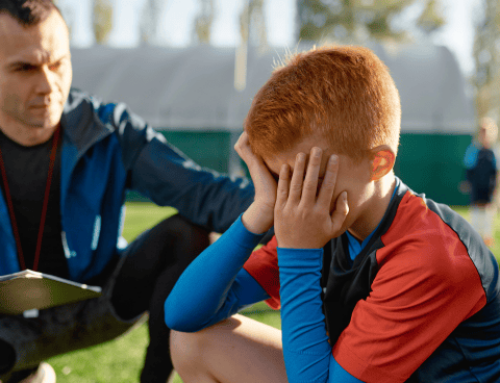You might struggle to connect with some kids on your team, but that doesn’t mean they’re “uncoachable”
Let’s face it, not every child comes to the team ready to actually be part of a team. The child might not have very good social skills. He may be a terrible listener. She may have an awful temper or inappropriate behavior. Maybe it’s a child who uses language that would make a sailor blush. Putting it bluntly, these are the kids that take the joy out of coaching. Managing them can take time away from the rest of the team as well.
Sometimes coaches say, “This kid is uncoachable.” What that really means is the coach is out of options to work with this child — not that the child is really unworkable.
As a licensed clinical social worker and a family coach I have a pretty big bias here, so I’ll put it out there right up front: No child, I mean absolutely no child, is uncoachable.
There, I said it. I feel a lot better. Now, let’s look into why I feel so strongly about this.
There may be children who need some kind of intervention before they are ready to proceed on the team. But that doesn’t make them uncoachable. It makes them worthy of our attention and support so they can get ready to join the team.
Often the children with the worst behavior who seem oblivious to social cues and basic rules of conduct are the ones that need the team the most. These children may be experiencing bullying, hunger, extreme poverty or even abuse or neglect at home. The parents might seem great to you, but you have no idea what is going on behind closed doors. Their behavior should be viewed as a sign they need help, not that they need to be kicked off the team.
Imagine for a moment, you are a troubled child. Your home life is a wreck. You are doing terribly in school, and you have few friends. Now, imagine that you also happen to be good at sports. You enjoy it, and that’s the one place you feel like you can let go a little. How would you feel to be told you can no longer be on the team because you are basically uncoachable? I can’t even bear to think of the pain a child would feel in that moment.
So, what to do with the child who doesn’t listen, disrupts the team and is a general thorn in your side? Well, that takes a second to unpack. Before doing anything else, a coach should assess if the child’s basic needs are being met or if there are problems at home that are impacting the child. Very often there is something that can be done to help the child and that in and of itself can improve behavior.
Additionally, think of this seemingly uncoachable kid as a puzzle. Find a way to decode and reach this player.
For example, ask yourself if the troublemaker could benefit from:
- An assigned buddy
- Some extra one-on-one time with a coach
- Additional supervision by a parent
- A leadership or vital role on the team
- Ignoring some of the attention-seeking behavior
- Lower expectations
- Moving up or down in the league to a more appropriate level
Being kicked off a team is humiliating and scarring. It’s not something a child forgets easily. So, no matter how awful the behavior, remember that the kid is still just a kid. Keep at it to find a way to make a difference in this life.
Read the original article on mojo.com By Catherine Pearlman, PhD, LCSW
About MOJO
MOJO is on a mission to make youth sports more fun for everyone — one kid, one coach, one family at a time. Launched in February 2021, MOJO is a robust digital platform that empowers parents who coach youth sports to bring world-class training to the largest pool of players in the world — kids aged 13 and under. MOJO believes that youth sports has the power to transform lives, not just for the kids on the field but the coaches and parents on the sidelines. MOJO is committed to equity, inclusion and helping level the playing field for kids everywhere. For more information, visit www.mojo.sport. MOJO can also be found on Facebook, Twitter, and Instagram.
Catherine Pearlman, PhD, LCSW, is a therapist, avid youth sports parent and founder of The Family Coach.
RECOMMENDED FOR YOU
MOST POPULAR
You might struggle to connect with some kids on your team, but that doesn’t mean they’re “uncoachable”
Let’s face it, not every child comes to the team ready to actually be part of a team. The child might not have very good social skills. He may be a terrible listener. She may have an awful temper or inappropriate behavior. Maybe it’s a child who uses language that would make a sailor blush. Putting it bluntly, these are the kids that take the joy out of coaching. Managing them can take time away from the rest of the team as well.
Sometimes coaches say, “This kid is uncoachable.” What that really means is the coach is out of options to work with this child — not that the child is really unworkable.
As a licensed clinical social worker and a family coach I have a pretty big bias here, so I’ll put it out there right up front: No child, I mean absolutely no child, is uncoachable.
There, I said it. I feel a lot better. Now, let’s look into why I feel so strongly about this.
There may be children who need some kind of intervention before they are ready to proceed on the team. But that doesn’t make them uncoachable. It makes them worthy of our attention and support so they can get ready to join the team.
Often the children with the worst behavior who seem oblivious to social cues and basic rules of conduct are the ones that need the team the most. These children may be experiencing bullying, hunger, extreme poverty or even abuse or neglect at home. The parents might seem great to you, but you have no idea what is going on behind closed doors. Their behavior should be viewed as a sign they need help, not that they need to be kicked off the team.
Imagine for a moment, you are a troubled child. Your home life is a wreck. You are doing terribly in school, and you have few friends. Now, imagine that you also happen to be good at sports. You enjoy it, and that’s the one place you feel like you can let go a little. How would you feel to be told you can no longer be on the team because you are basically uncoachable? I can’t even bear to think of the pain a child would feel in that moment.
So, what to do with the child who doesn’t listen, disrupts the team and is a general thorn in your side? Well, that takes a second to unpack. Before doing anything else, a coach should assess if the child’s basic needs are being met or if there are problems at home that are impacting the child. Very often there is something that can be done to help the child and that in and of itself can improve behavior.
Additionally, think of this seemingly uncoachable kid as a puzzle. Find a way to decode and reach this player.
For example, ask yourself if the troublemaker could benefit from:
- An assigned buddy
- Some extra one-on-one time with a coach
- Additional supervision by a parent
- A leadership or vital role on the team
- Ignoring some of the attention-seeking behavior
- Lower expectations
- Moving up or down in the league to a more appropriate level
Being kicked off a team is humiliating and scarring. It’s not something a child forgets easily. So, no matter how awful the behavior, remember that the kid is still just a kid. Keep at it to find a way to make a difference in this life.
Read the original article on mojo.com By Catherine Pearlman, PhD, LCSW
About MOJO
MOJO is on a mission to make youth sports more fun for everyone — one kid, one coach, one family at a time. Launched in February 2021, MOJO is a robust digital platform that empowers parents who coach youth sports to bring world-class training to the largest pool of players in the world — kids aged 13 and under. MOJO believes that youth sports has the power to transform lives, not just for the kids on the field but the coaches and parents on the sidelines. MOJO is committed to equity, inclusion and helping level the playing field for kids everywhere. For more information, visit www.mojo.sport. MOJO can also be found on Facebook, Twitter, and Instagram.
Catherine Pearlman, PhD, LCSW, is a therapist, avid youth sports parent and founder of The Family Coach.











